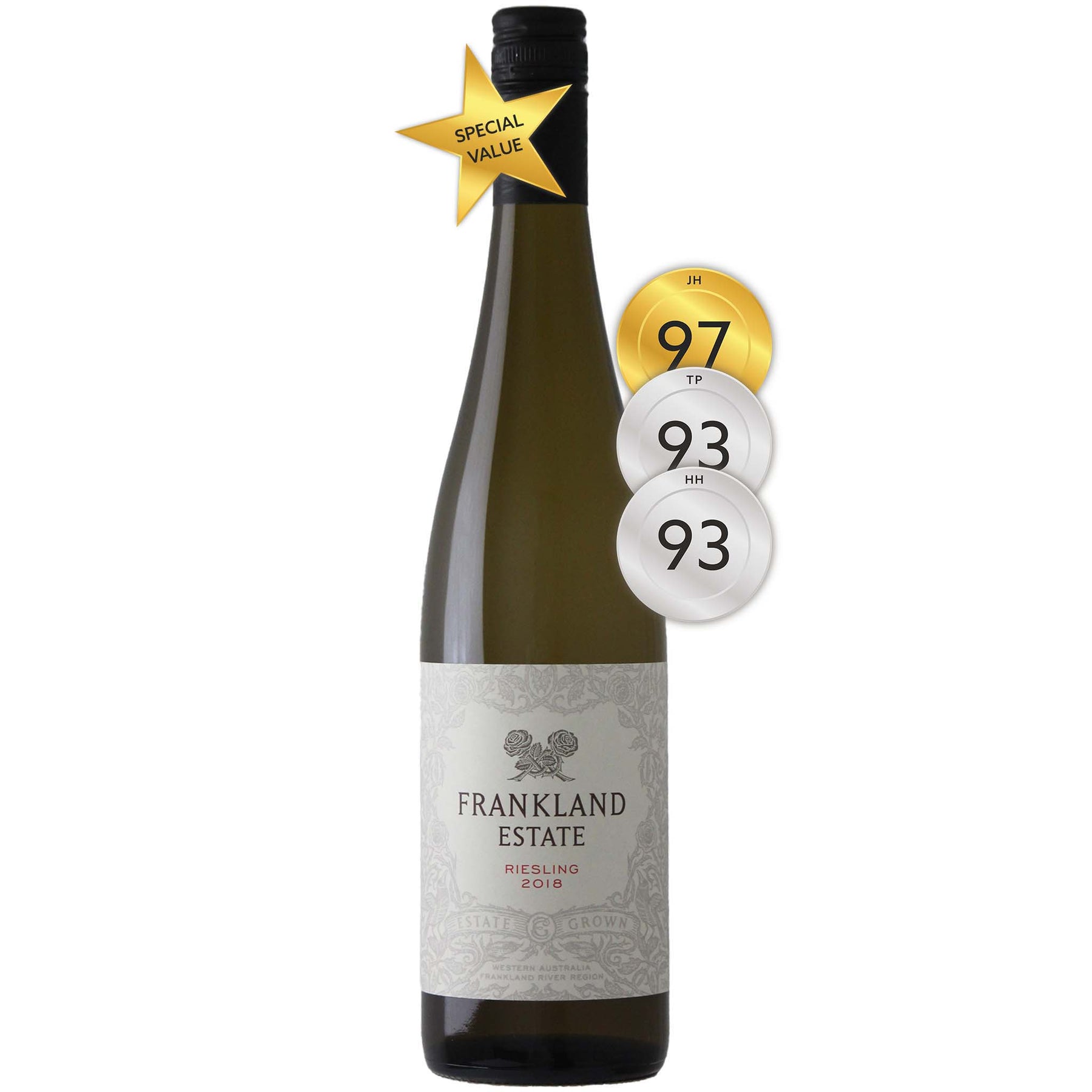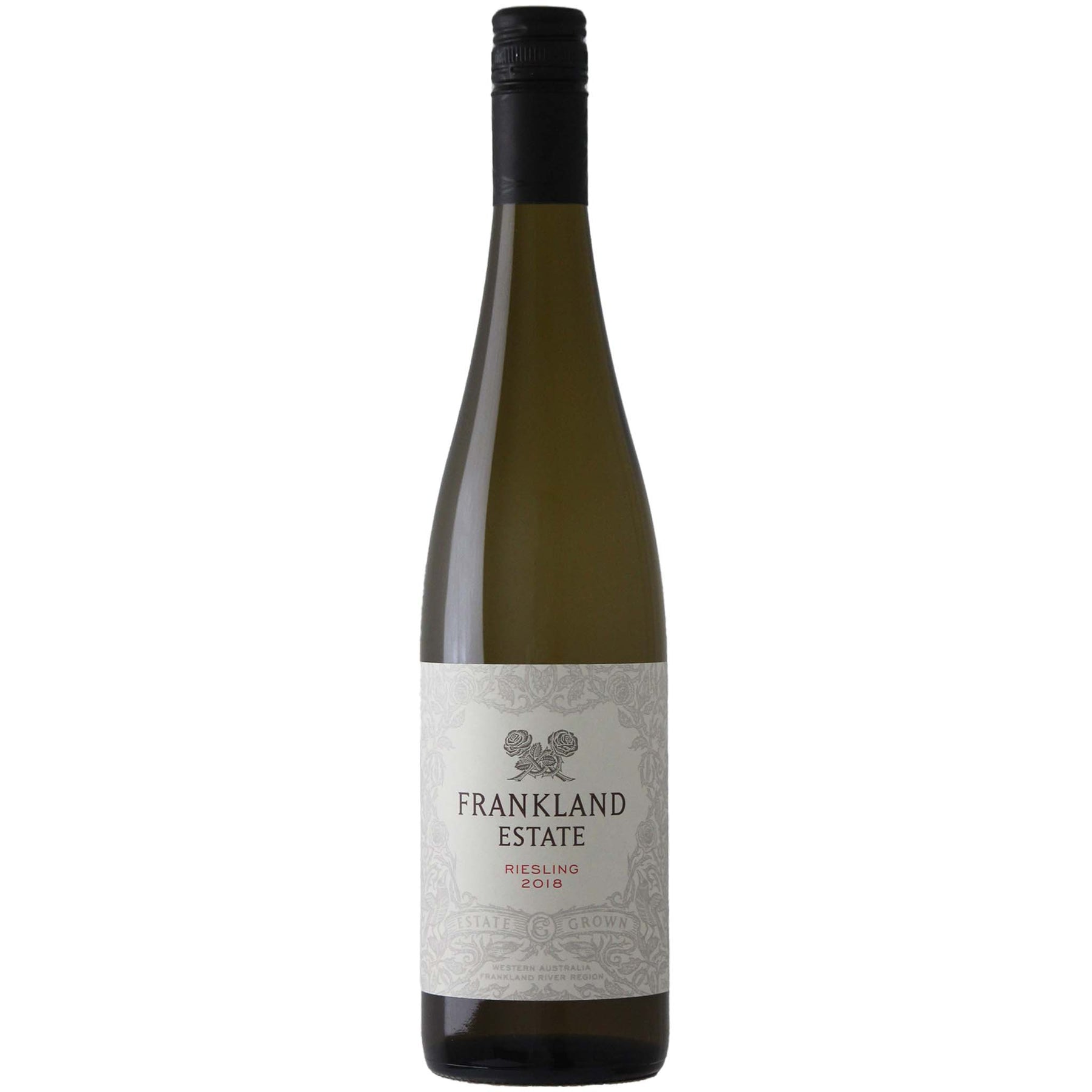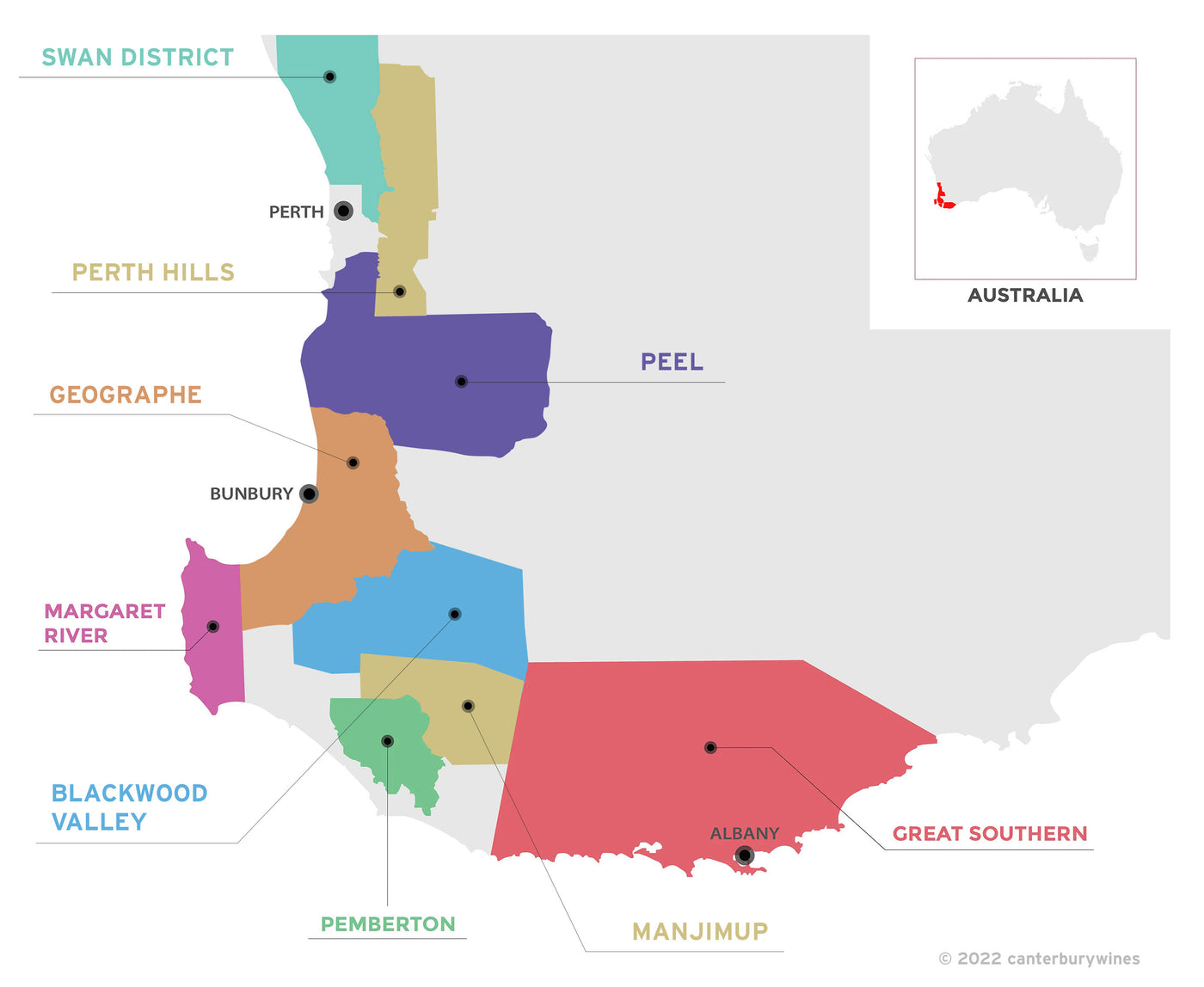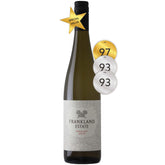

Frankland Estate Riesling 2018
Style: White Wine
Closure: Screwcap
Frankland Estate Riesling 2018
Warehouse
34 Redland Drive
Vermont VIC 3133
Australia
Critic Score: 97
Alcohol: 12.7%
Size: 750 ml
Drink by: 2035
"Frankland Estate is a superb, family-run, ecologically sensitive estate in a beautiful, extremely isolated location." Jancis Robinson MW
"Frankland Estate is one of Australia's greatest Riesling producers." Huon Hooke
Barrie Smith and Judi Cullam first planted vines on their large Frankland River grazing property in 1988. They named the vineyard 'Isolation Ridge', which reflected the remoteness of the site in the southwest of Western Australia. Today, second generation siblings Hunter and Elizabeth Smith run the Frankland Estate winery and 40 hectare vineyard which was certified organic in 2009. The major focus has always been on Riesling for which they are justifiably famous.
"100% estate-grown. A highly floral/citrus blossom bouquet, the palate intensely focused on lime juice and acidity molded into the wine and extending its length over the horizon." James Halliday
Expert reviews
"100% estate-grown. A highly floral/citrus blossom bouquet, the palate intensely focused on lime juice and acidity molded into the wine and extending its length over the horizon. Drink by 2038." James Halliday, Halliday Wine Companion - 97 points and Special Value Wine ★
"Bright, light yellow hue and a refined, fragrant aroma, fresh and aromatic. There are lime and lemon aromatic notes and a hint of passionfruit in this lovely delicate bouquet. It's intense, fine, dry and long in the mouth, not entirely without phenolic grip but nothing like the Alter Weg in that respect. A gorgeous riesling. Drink: 2019-2028." Huon Hooke, The Real Review - 93 points
"An intense wine laden with ripe fruit. Ripe lime, nectarine and a touch of honey. Powerful, expressive and satisfying. Drink: 2019-2027." Toni Paterson MW, The Real Review - 93 points
Awards
Special Value Wine – Halliday Wine Companion ★
Frankland River
 The Great Southern wine region of Western Australia is the most ancient, most isolated and largest wine region in the world. The region is up to 2.8 billion years old and covers over 1.7 million hectares, a whopping 200 kilometres from east to west and 100km from north to south. Since the Nyittiny – creation times – our First Nations people of the Wagyl Kaip region have shared and cared for this Great Southern country.
The Great Southern wine region of Western Australia is the most ancient, most isolated and largest wine region in the world. The region is up to 2.8 billion years old and covers over 1.7 million hectares, a whopping 200 kilometres from east to west and 100km from north to south. Since the Nyittiny – creation times – our First Nations people of the Wagyl Kaip region have shared and cared for this Great Southern country.
Great Southern time is a place of dramatic contrasts - striking tall timber forests, swathes of rich agricultural land, imposing mountain ranges, dramatic peaks and ancient rivers. Due to its vast size and spread, it features not only different terroirs but climates that vary from the Mediterranean through to the maritime, resulting in unique wines that reflect their natural surroundings. From this diversity a wine region of international significance and reputation has emerged – the pristine Great Southern wine region.
The region is divided into five distinct sub-regions, each producing wine styles that reflect their unique terroir. The sub-regions are Porongurup, Frankland River, Mount Barker, Denmark and Albany - refer to the map below.
Frankland River sub-region
Frankland River wine, one of Western Australia’s best-kept secrets, is located approximately 360 kilometers south of Perth and lies 80 kilometers inland from the coast. Home to rolling hills, rich farming land and natural forest abounding with native wildflowers, it is named after the river which bisects it and the town at its center. Frankland River is the highest of the Great Southern sub-regions, with most vineyards sitting between 150 to 300 meters above sea level. With 1,600 hectares of vines planted, it is also the most prolific of the five sub-regions.
Frankland River is home to some of the oldest vines in Western Australia, with the first modern-day vineyards planted in 1967 on a property owned by the Roche family of Perth. This vineyard is now owned by Houghton and supplies them with some ultra-premium grapes. Three years later, in 1971, Merv and Judy Lange began planting vines on their Alkoomi property.
Today, there are six wineries located in the sub-region – Frankland Estate, Alkoomi, Swinney, Ferngrove, Lange Estate and Three Elms. In addition, many of Western Australia's iconic wineries source fruit from the area for their wines. Frankland River is home to plantings of all the traditional Australian grape varieties, however, it is internationally best recognised for producing premium cool climate Shiraz and Riesling. Is one of the State’s most successful wine producing regions and its impressive wine show success is testament to the quality of its vineyards and wines.
Frankland River has a true Mediterranean climate, with cool nights and warm days with long sunlight hours. Despite being 80 km inland, a moderating sea breeze from the Southern Ocean finds its way into the region and is a significant boon to local vineyards. In Albany, the equivalent wind is known as the 'Albany Doctor', after the more famous 'Fremantle Doctor' which cools the baked vineyards of the Swan District near Perth. The sea breeze, together with the elevation of the vineyards, create a long, slow ripening season that give the wines intensity of fruit, finesse, freshness and longevity.
Frankland River's soils and topography consist of significant alluvial features. Ironstone-based gravel soils derived from granitic outcrops line the river valleys and rolling hills. These rich, red ironstone gravels often impart a unique flavour to the wines.

Frankland River is one of the five sub-regions of Great Southern
Isolation Ridge vineyard

Frankland Estate’s Isolation Ridge Vineyard has become an enduring symbol of one of the world’s most remote wine regions. The almost 40-hectare property was planted in 1988, with Hunter Smith the second generation to tend the vines, evolving the sustainable farming to achieving organic certification over a decade ago. Riesling leads the charge at Isolation Ridge, but the Bordeaux red varieties, shiraz and chardonnay aren’t too far behind, with newer additions like mourvèdre and grüner veltliner already making striking wines.
After working in Bordeaux for a couple of vintages, Barrie Smith and Judi Cullam established vines on their large Frankland River grazing property in 1988. Back then, there was a firm focus on riesling as well as cabernet franc, cabernet sauvignon, malbec, petit verdot and merlot to make a Bordeaux-inspired blend – called 'Olmo’s Reward' after pioneering viticulturist Dr Harold Olmo. Shiraz and chardonnay were also planted, but the 37-hectare vineyard has been tweaked over the years to now include mourvèdre, touriga nacional, marsanne, viognier and grüner veltliner.
When it was first planted, a family friend jokingly suggested the name Isolation Ridge for the vineyard, reflecting the remoteness of the site within Australia’s most isolated and sparsely populated wine regions. That name stuck, and the very nature of that solitude has deeply shaped the kind of operation Frankland Estate is, being tended almost solely by family hands and requiring a good deal of ingenuity along the way.
Today, Smith and Cullam’s son Hunter Smith runs the viticultural operations. "Being a viticulturist in this region makes you think outside the square, solve problems and challenges in unique ways, and with that, we believe we have highlighted the trueness of this unique terroir through a thoughtful hands-off approach."
Smith has refined the sustainable methods used before him to transition to organic practices in 2006, with certification coming in 2009. "We implemented organics 15 years ago to build resilience in the vines through greater health, increasing water-holding capacity from organic matter, increasing microbiology and improving responsiveness to nutrient sourcing in a balanced way. This approach also improves fruit quality significantly."
With 80 per cent of the winery’s electricity needs now supplied by solar power, the family is working towards a "closed circuit" approach, where their property can one day be self-sufficient. Smith also sees the imperative of managing a warming climate as much a social responsibility as it is a means to both survive economically and thrive as a wine producer.
"A changing climate and drier conditions have us always thinking in new ways and adopting new practices to allow the vines to be more resilient and healthier," says Smith. "Being nimble and adapting vineyard practice to suit any given season is now essential… We run 2,000 acres of land that the family have been farming for 40 years, and we have a deep connection to the region and the land. We are custodian to over 150 hectares of native forest, and we have planted thousands of trees over the past 20 years, improving land use for the future."
The gently undulating vineyard is planted to ironstone soils above an iron-rich clay subsoil, which is a combination that Smith believes defines the wines, and it’s a quality that he’s always keen to enhance. "We’re nurturing the site to further express its uniqueness as one of the most isolated vineyards in the world," he says.
"As my experience with our vineyard site has developed, so too has my confidence that it won’t let me down, but rather reward me for taking a backseat, not intervening for the sake of intervention. As a result, we have seen an increasing rate and consistency of our ‘Isolation Ridge’ character. Preciseness, delicacy, minerality… ironstone, flinty minerality, as we call it, runs more and more vigorously through our wines the more we step back and work with naturally occurring biology and naturally occurring inputs."
Over the years, with this character in mind, Smith has grafted vines over to varieties that he believes will be climate suitable, but also will make wines that will be enhanced by the distinctive mineral notes that the soils produce, with him listing mourvèdre, touriga nacional and grüner veltliner as some successful examples. Smith also notes that their increasing understanding of the site has also had a profound influence on their winemaking, of which he shares the duties with his brother-in-law Brian Kent.
"The combination of moving to organic viticulture, along with the vines gaining in maturity have allowed us to enjoy the ability to be more hands-off in the winery," says Smith. "The fruit has more purity to it and ripeness levels don’t have to be pushed to 'get flavour'. In 20 years, barrel formats have changed at Frankland Estate from 225 litres to 500 litres, and now on to 3,500 litres, and with each change bringing a greater honesty and vibrancy, a truthfulness in the wine that has become more apparent.
"All the wines provide us with the same fine, medium-weighted deeply flavoured profile." But, notes Smith, "a vineyard character cannot simply be put down to a flavour, as it is as much about the texture, weight and personality of the wines. It’s very much all encompassing, just like it is out in the vineyard."
The above text is taken from an article that appeared in Young Gun of Wine in 2020.

Winemaker and viticulturist Hunter Smith in his vineyard
The winery

"Frankland Estate is a superb, family-run, ecologically sensitive estate in a beautiful, extremely isolated location." Jancis Robinson MW
Frankland Estate winery is located on a large Frankland River grazing property purchased by Barrie Smith and Judi Cullam in 1978. The couple first planted vines on the property in 1988 and named the vineyard 'Isolation Ridge', which reflected the remoteness of the site in the southwest of Western Australia. Their vision was to make some of Australia’s most distinctive wines in the country from one of the most isolated wineries in the world.
Success and accolades came quickly, and Frankland Estate established some enviable domestic and export markets. In a 1955 study of potential grapegrowing sites, renowned Californian viticulturalist Dr Harold Olmo identified Frankland River as one of the most promising prospects in Australia. The wines of Frankland Estate proved he was right.
Barrie Smith grew up on a vineyard in South Australia’s Riverland and worked the vineyards with his father and brothers. His family moved to a farm in the Frankland River region in the 1950s and Barrie followed his family to Western Australia in 1962. He took to selling real estate in Perth, met Judi Cullam who he married in 1972 and moved to Frankland River. They purchased their grazing property 'Rocky Ridge', located just down the road from his family, in 1978 and started farming sheep and wheat.
Barrie's passion for wine saw him make a single barrel of "house wine" every year. A trip to France in the mid 1980s with Bill Hardy of Thomas Hardy and Sons, followed by working in Bordeaux for a couple of vintages at Chateau Senejac, kindled an interest in planting some vines at 'Rocky Ridge'. Barrie also did several vintages with local wineries gaining experience and with this knowledge Barrie and Judi planted their first vines in 1988. Barrie’s tireless and stoic work behind the scenes saw the Isolation Ridge vineyard grow from a modest eight hectares in 1988 to 25ha by 1995. The major focus has always been on Riesling – Judi is a relentless advocate for Riesling and to this end has established the Biennial Frankland Estate Riesling Conference – but initially they also planted lesser quantities of chardonnay, shiraz and cabernet sauvignon and small amounts of merlot, malbec and cabernet franc.
Today the Smith children, Hunter and Elizabeth, run the winery. This second generation team has continued to grow the size of the vineyard to 40 hectares, and it now includes plantings of mourvèdre, touriga nacional, marsanne, viognier and grüner Veltliner, varieties that they believe will be climate suitable, but also will make wines that will be enhanced by the distinctive mineral notes that the soils produce.
Hunter became a full-time member of the Frankland Estate team in 1999 and runs the viticultural and winemaking operations. He shares winemaking duties with Elizabeth 's husband Brian Kent, who joined the family business in 2010. Smith has refined the sustainable methods used before him to transition to organic practices in 2006, with certification coming in 2009. "We implemented organics to build resilience in the vines through greater health, increasing water-holding capacity from organic matter, increasing microbiology and improving responsiveness to nutrient sourcing in a balanced way. This approach also improves fruit quality significantly. The combination of moving to organic viticulture, along with the vines gaining in maturity have allowed us to enjoy the ability to be more hands-off in the winery," says Smith. "The fruit has more purity to it and ripeness levels don’t have to be pushed to get flavour."
Hunter and Brian have focused on every facet of the organically farmed vineyard and their winemaking techniques to help realise Frankland Estate’s immense potential. That hard work has resulted in a suite of brilliant wines, which includes the Estate range, the single vineyards and the flagships. All confirm Frankland Estate as a leading light among Australia’s terroir-driven winegrowers.
"Frankland Estate is one of Australia's greatest wine producers with a thirst for excellence." Mike Bennie


Western Australia
Western Australia is home to more than 400 wineries across nine vast and extraordinary wine regions which are almost entirely concentrated in the south-west and great southern land divisions of the State. The regions are Blackwood Valley, Geographe, Great Southern, Peel, Pemberton, Manjimup, Margaret River and Swan District.
The oldest region is the Swan Valley, the best known both nationally and internationally is Margaret River and the largest is Great Southern. The Great Southern region is further divided into the five subregions of Albany, Denmark, Frankland River, Mount Barker and Porongurup.
The history of wine production in Western Australia dates back to 1840 with the establishment of Sandalford in the Swan Valley region. The recognition of the fine wine possibilities started to be realised after the establishment of the Margaret River Region in 1967, which has become renowned for its high quality Chardonnay and Cabernet Sauvignon. The other regions produce a diverse range of regionally distinct wines, from stunning Rieslings and evocative Shiraz, to a range of unique Cabernet Sauvignon blends.

